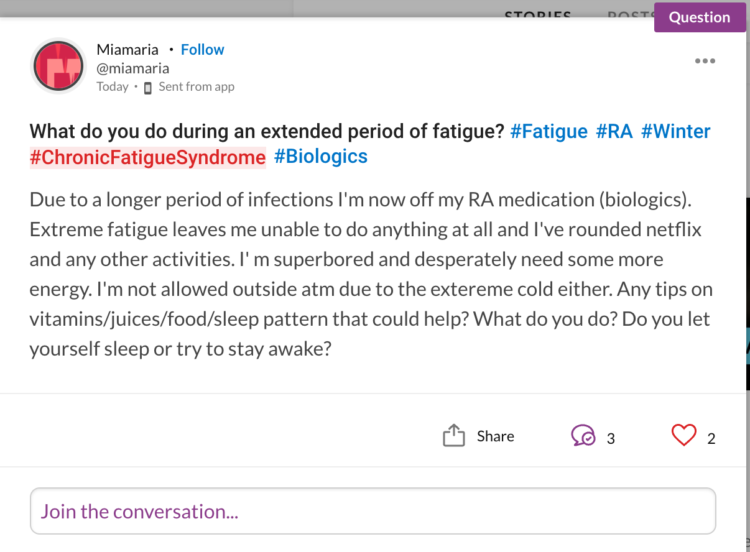When you are diagnosed with a chronic illness, everyone worries about your physical well-being: whether or not you are taking your medicine, how your pain levels are, if your blood’s OK, how your liver is doing… You do hours and hours of tests every year to make sure your body is still somewhat functional, at least enough to keep you alive, and yet not one medical practitioner ever asks, “How is your mental health?”
Don’t get me wrong – I know they already have so much on their plate and their main focus is your physical health, but from the time I was 15 to now, almost 10 years later, no one has inquired about my mental health.
The pain and the knowledge your body is deteriorating and will never get better is a lot to handle at any age. But all the worries, fears, sense of loneliness and stigmas combined takes a toll on your mental health.
Join the conversation! Answer this question:
I have only learned in the past couple of years that the emotional rollercoaster I am on with my rheumatoid arthritis is normal. I have learned this from meeting with and talking to a variety of others with the same or similar conditions.
I often wondered if I was exaggerating all the side effects of this illness. I wondered, should I really “miss” an old version of myself? Is that just feeling sorry for myself? Was I allowed to feel sorry for myself? Was I too sensitive when someone implied I was lazy? And how was I supposed to feel when someone blamed my diet on my illness? These were not questions I was willing to ask my doctor or my nurse.
For the most part I just “got on with it,” but there would be days when I would convince myself I was entirely useless as a human being. That I was a waste of energy and resources on my friends and family. I mean, what kind of 16-year-old girl can’t dress herself? No one told me these were thoughts that most people with lifelong illness experience at some point or another. But then again, I didn’t ask. I didn’t ask because that would make me a “moaner” and that was the last thing I wanted to be on top of “lazy” and “useless.”
Then there would be times when I would feel a rush of anger towards someone’s ignorance. They said the wrong thing or just stood there in disbelief that I, a teenage girl, could have arthritis.
I worried about my future. I wanted a career, a high-flying career. Suddenly I didn’t know if that would be possible. Sometimes I doubted my ability to get through school – never mind college – and then pursue a career. I was terrified I would become a housewife except with no husband or children. I was so unsure of what the future held; it was worse than any horror film for me.
These were all things my mind did each and every day. I questioned, why me? Or wondered if I had caused it, if I had done something to deserve it. I wanted to tell someone how frustrating it all was! How angry it made me feel when no one understood and how devastating it was when people just thought I was lazy.
My mind came up with new questions each day, new things to worry about. To be honest, the mental toll is often worse than the physical one for me. The pain wouldn’t be so bad if I could accept my limitations, if people understood or if the illness didn’t make me feel like the shell of the person I was before. If I could better deal with the emotional side effects of a chronic illness, the physical ones would be much easier to get a handle on.
Mental health is vital, no matter how physically healthy you are, and the world is beginning to see that. It is slow but it is progressing. Having a chronic illness is not the same as having anxiety or depression but it can cause you to develop those conditions, too. You have to look after your mental well-being no matter who you are or what you have or don’t have in life.
I find writing has helped me in leaps and bounds. Not only does it allow me to get everything off my chest, but as I publish it to the public it allows me to connect with others who say, “Me too!” If writing is not your thing, a chat with a friend can do a world of good. You just have to be brave and tell them how you are really feeling.
As the years go on, you learn so many coping mechanisms and little ways to make your life easier, but you also learn how to deal with those thoughts a little better. You learn it is OK to not always be OK. That crying can relieve some of the frustration and that feeling hurt when someone implies you are less than you were is more than justified. That grieving the old you is normal and even healthy and that from time to time you will feel a little useless.
If you accept these feelings and actually deal with them, you will be all the better off for it. Your feelings are not invalid; they are never invalid. So right now, this minute, take a moment or two to write it all down or talk it all out or go scream into a pillow. Whatever works for you. But don’t hide from your emotions – you can’t hide from your illness and you certainly shouldn’t hide from your feelings. You may feel broken, but you have the power to be the strongest you have ever been. You just have to take it.
Follow this journey on Facebook or The Girl With the Old Lady Bones.
Image via Thinkstock.


